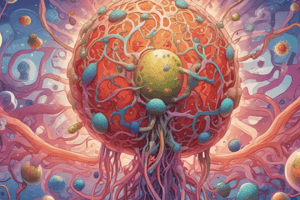Podcast
Questions and Answers
What is microbiology primarily concerned with?
What is microbiology primarily concerned with?
- Exploring the world of astronomy
- Understanding the structure, function, and classification of microorganisms (correct)
- Studying the behavior of mammals
- Analyzing geological formations
Who was the first to observe and document microbes using a microscope?
Who was the first to observe and document microbes using a microscope?
- Isaac Newton
- Marie Curie
- Antonie van Leeuwenhoek (correct)
- Albert Einstein
Where can microorganisms be found?
Where can microorganisms be found?
- Outer space only
- Volcanic regions solely
- Underground caves exclusively
- Soil, water, air, and the human body (correct)
Why was the term 'microbe' coined in the late 19th century?
Why was the term 'microbe' coined in the late 19th century?
In what century did microbiology expand its interdisciplinary collaboration?
In what century did microbiology expand its interdisciplinary collaboration?
What is a current need in microbiology data management?
What is a current need in microbiology data management?
What is one way in which microbiology is applied in the industry?
What is one way in which microbiology is applied in the industry?
Why is understanding the biology of pathogens important?
Why is understanding the biology of pathogens important?
What is a major challenge in microbiology due to some microbial species not being cultivated in the laboratory?
What is a major challenge in microbiology due to some microbial species not being cultivated in the laboratory?
What role do fungi play in industry according to the text?
What role do fungi play in industry according to the text?
Why is continued research and collaboration essential in microbiology?
Why is continued research and collaboration essential in microbiology?
How do bacteria contribute to industry based on the information provided?
How do bacteria contribute to industry based on the information provided?
Flashcards are hidden until you start studying
Study Notes
Introduction
Microbiology is the scientific study of microorganisms, a diverse group of life forms that include bacteria, archaea, algae, fungi, protozoa, and viruses. These organisms are generally minute in size and can be found in various habitats such as soil, water, air, and the human body. Microbiology is concerned with understanding the structure, function, and classification of these organisms, as well as developing methods for both exploiting and controlling their activities.
Historical Background
The discovery of living forms invisible to the naked eye began with the development of the microscope. Antonie van Leeuwenhoek, a Dutch draper who was fascinated with lens grinding and microscopes, was the first to document his observations of microbes. He described protozoans from the guts of animals and bacteria from teeth scrapings. The word "microbe" was coined in the late 19th century to describe these organisms, which were initially thought to be related. As microbiology developed into a specialized science, it was found that microbes are a very large and diverse group of organisms.
Progress in the 21st Century
In the 21st century, microbiology has reached across traditional departmental boundaries to integrate the expertise of scientists in other disciplines. A need exists for quantitative digital formatting of microbiological data in a portable and standardized fashion, and efforts should be made to standardize data collection and annotation. Researchers must work together with scientists in related fields, computational scientists should become more familiar with microbiology, and microbiology materials and data must be more carefully curated.
Applications in Health and Industry
Microorganisms play a crucial role in human health and industry. In medicine, microbiology is essential for diagnosing and treating infectious diseases. Bacteria, viruses, and fungi can cause a wide range of diseases, from common colds to deadly infections. Understanding the biology of these pathogens helps in the development of vaccines, antibiotics, and other treatments. Microbiology is also used in industry for the production of foods, beverages, and other valuable products. For example, bacteria are used to ferment sugar into wine, beer, and cheese. Fungi are used in the production of antibiotics and insulin.
Future Challenges
Despite the significant advances in microbiology, there are still many challenges to overcome. For example, many microbial species have never been cultivated in the laboratory, which limits our understanding of their biology and potential applications. Additionally, the rise of antibiotic-resistant bacteria and the emergence of new diseases pose significant challenges to public health. To address these challenges, continued research and collaboration between microbiologists and other scientists are essential.
In conclusion, microbiology is a crucial field of study that has made significant contributions to our understanding of life and our ability to diagnose and treat diseases. As our knowledge of microorganisms continues to grow, so too will our ability to harness their potential for the betterment of human health and industry.
Studying That Suits You
Use AI to generate personalized quizzes and flashcards to suit your learning preferences.




